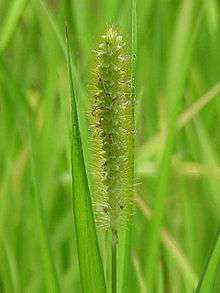Setaria pumila
| Setaria pumila | |
|---|---|
 | |
| Scientific classification | |
| Kingdom: | Plantae |
| (unranked): | Angiosperms |
| (unranked): | Monocots |
| (unranked): | Commelinids |
| Order: | Poales |
| Family: | Poaceae |
| Genus: | Setaria |
| Species: | S. pumila |
| Binomial name | |
| Setaria pumila (Poir.) Roem. & Schult. | |
| Synonyms[1] | |
| |
Setaria pumila is a species of grass known by many common names, including yellow foxtail,[2] yellow bristle-grass,[3] pigeon grass, and cattail grass. It is native to Europe, but it is known throughout the world as a common weed. It grows in lawns, sidewalks, roadsides, cultivated fields, and many other places. This annual grass grows 20 centimeters to well over a meter in height, its mostly hairless stems ranging from green to purple-tinged in color. The leaf blades are hairless on the upper surfaces, twisting, and up to 30 centimeters long. The inflorescence is a stiff, cylindrical bundle of spikelets 2 to 15 centimeters long with short, blunt bristles. The panicle may appear yellow or yellow-tinged.
In New Zealand S. pumila can cover 20-40% of otherwise productive dairy farming pasture causing a loss in milk production.[4]
References
- ↑ "The Plant List: A Working List of All Plant Species". Retrieved 14 December 2014.
- ↑ "Setaria pumila". Natural Resources Conservation Service PLANTS Database. USDA. Retrieved 2 February 2016.
- ↑ "BSBI List 2007". Botanical Society of Britain and Ireland. Archived from the original (xls) on 2015-02-25. Retrieved 2014-10-17.
- ↑ "Weed control - Yellow bristle grass". AgResearch. Retrieved 20 April 2012.